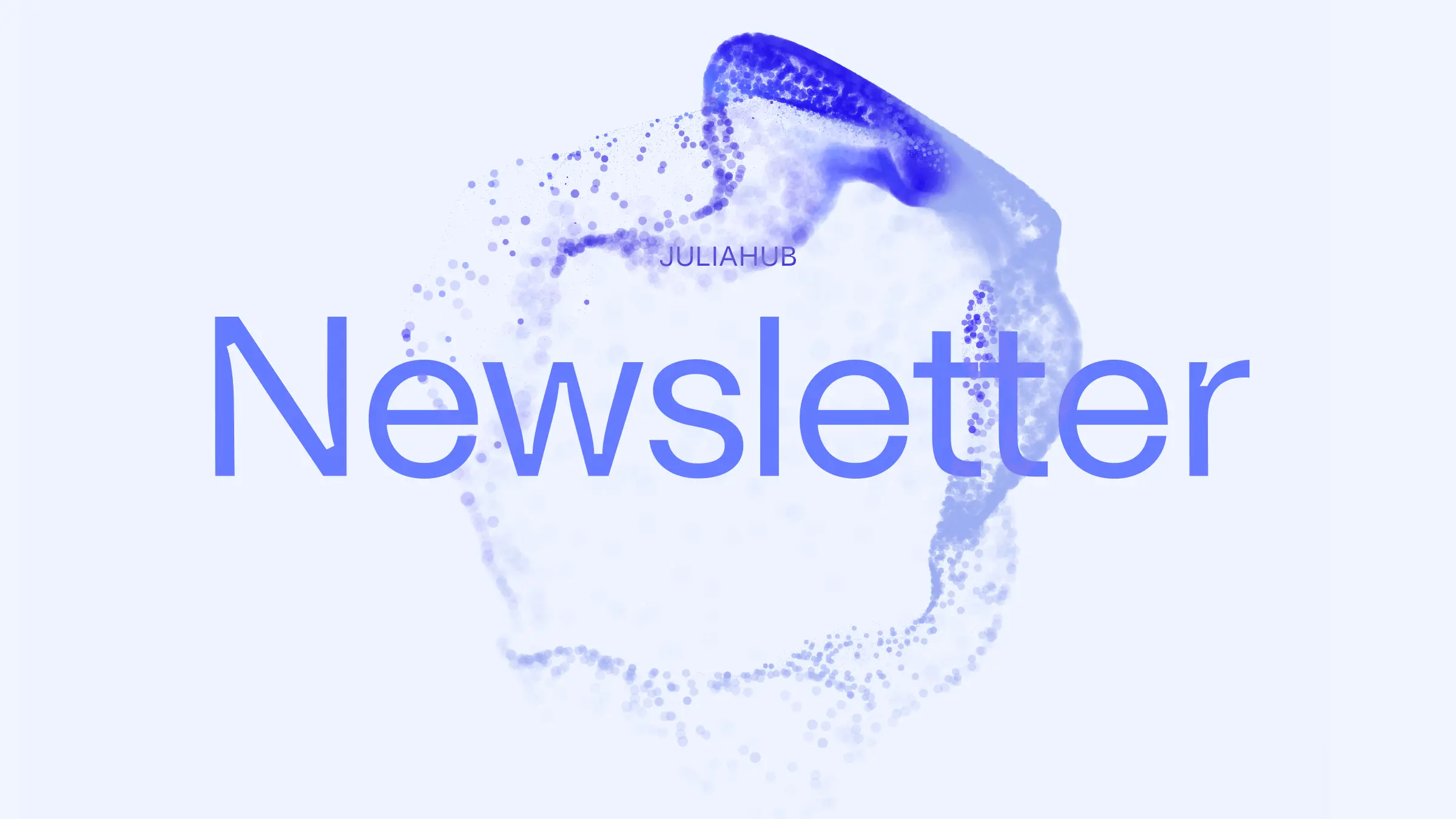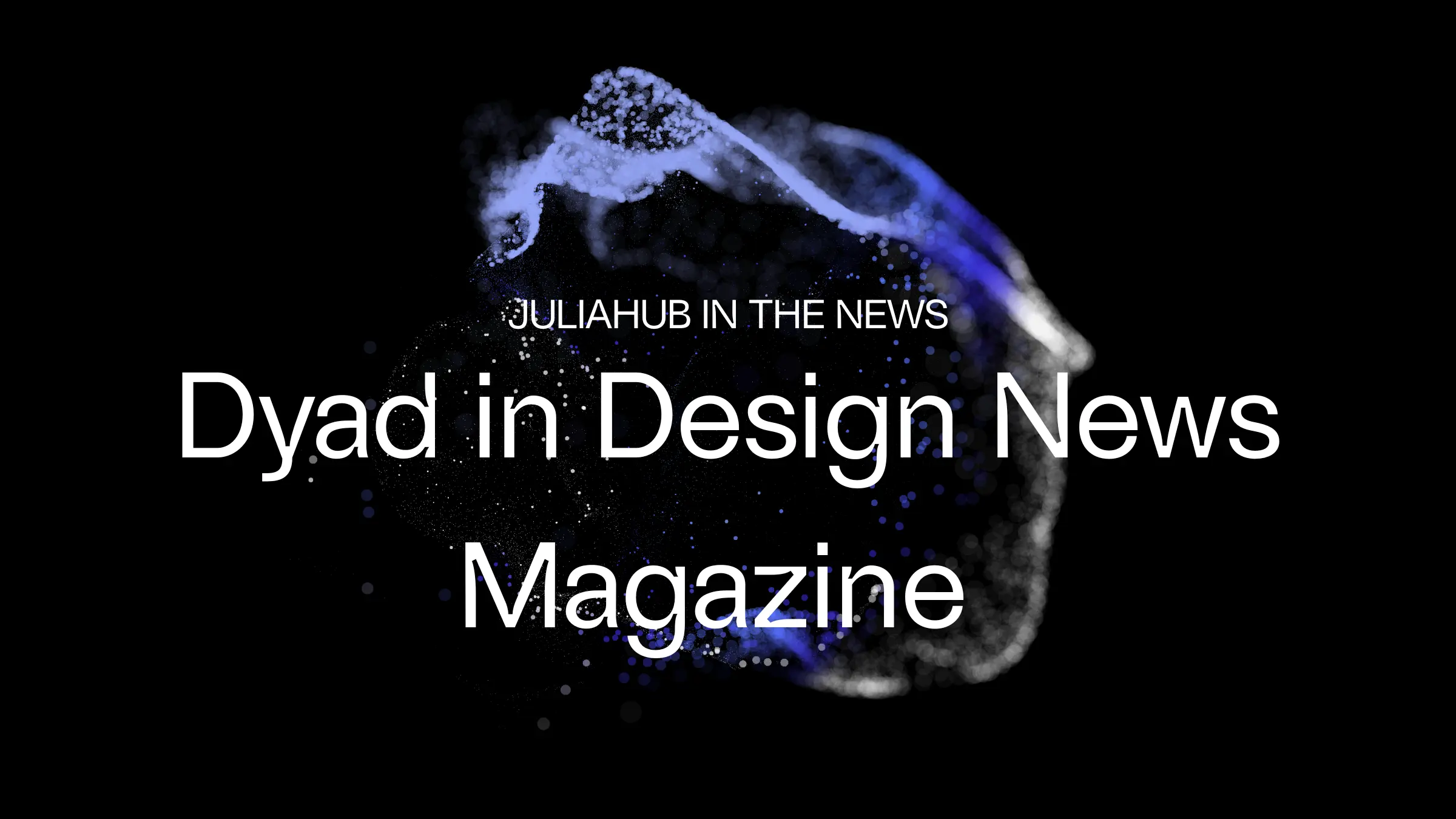Agentic AI for Model-Based Engineering: Dyad’s product team recently announced an agentic AI system that ensures physical correctness in model-based engineering. By combining AI agents with a constrained, unit-tested modeling environment, Dyad generates models that are not just fast—but accurate. Dyad’s AI doesn’t just generate code — it collaborates, reasons about physics, validates behavior, and produces reusable, deployment-ready models. From automated brake system calibration to full system simulations, Dyad transforms AI from a code assistant into an engineering partner. Read the full blog post and watch the video tutorial to see it in action.
JuliaHub CEO Dr. Viral Shah at Simulation World: Dr. Prith Banerjee moderated a panel discussion on Digital Engineering in the Age of AI with panelists including Buvna Ayyagari from Synopsys, Bill Vass from BoozAllenHamilton, Bob Tickel from Cummins, Dr. Mark T. Maybury from LockheedMartin, Nathan VanRheenen from Boeing, and JuliaHub CEO and Co-Founder Dr. Viral Shah. The panel discussed topics such as the use of digital engineering with MBSE and digital twins, the adoption of digital engineering in the automotive and aerospace industries, the use of simulation and virtual testing in digital engineering, the digital engineering ecosystem and cross-domain collaboration, use of AI/ML and agentic AI in digital engineering, and how the next generation of workers (Gen Z) will be trained in digital engineering.

Julia 1.12 Released: Julia 1.12 brings big upgrades: a new --trim feature and JuliaC for dramatically smaller binaries (“Hello World” now just ~1 MB, down from hundreds of MBs previously), redefinition of constants/structs, new tracing tools, improved multi-threading, OncePerX initialization, BOLT-optimized builds, expanded @atomic support, per-task metrics, and new Pkg features like Workspaces and Apps. Explore the full details in the release notes.
Julia Founders Featured at Open Source Friday: JuliaHub CEO Viral B. Shah joined fellow Julia co-creators Jeff Bezanson, Stefan Karpinski, and core contributor Keno Fischer for Open Source Friday, a global showcase of open innovation. Together, they shared insights on how Julia’s open source foundations power high-performance technical computing and scientific machine learning. Watch the recording.
A Vast ‘Cosmic Web’ Connects the Universe — Really. Now, We Can Emulate It: Effort.jl: a Fast and Differentiable Emulator for the Effective Field Theory of the Large Scale Structure of the Universe is a new article in the Journal of Cosmology and Astroparticle Physics. Effort.jl lets researchers mimic complex cosmic-web simulations with drastically less compute, enabling laptop-scale runs in hours instead of days. Built in Julia, it retains high fidelity while accelerating analysis and making it easier to test cosmological models. More information is available here.
JuliaHub at ACoP in Aurora, Colorado: JuliaHub will be attending the American Conference on Pharmacometrics October 18-21 in Aurora, Colorado. Please contact us if you will be in attendance and would like to connect.
Save the Date - JuliaCon 2026: JuliaCon 2026 will be held August 10-15, 2026 at Johannes Gutenberg University in Mainz, near Frankfurt, Germany. Click here for more information.
JuliaHub at JuliaCon Local in Paris: The Julia community in Europe organized JuliaCon Local Paris October 2-3, 2025. Dr. Tim Besard, JuliaHub Software Engineer presented a talk on Kernels Without Borders: Parallel Programming with KernelAbstractions.jl. The conference was eventful with plenaries, talks, tutorials, posters and hackathon sessions, accessible to Julia beginners and experts alike.
Fireside Chat with Dr. Bob Metcalfe: JuliaCon 2025 featured a fireside chat with Dr. Bob Metcalfe and Professor Alan Edelman, now available on YouTube. Dr. Metcalfe is co-inventor of Ethernet, co-founder of 3Com, winner of the Turing Award, creator of Metcalfe’s law and former professor of Innovation and Entrepreneurship at the University of Texas at Austin. Professor Alan Edelman is Chief Scientist and Co-Founder at JuliaHub, co-creator of Julia, principal investigator of the JuliaLab at MIT and winner of the Sidney Fernbach Award and the Gordon Bell Prize.
New Blog Posts from JuliaHub: JuliaHub has published a number of new blog posts about Dyad and other topics of interest to Julia users. Click the links below for more.
Stop Re-Inventing the Wheel: Modeling with Dyad’s Standard Libraries
Power, Precision, and Performance: Recent Updates to JuliaHub
Hands-On with Dyad: Learn Acausal Modeling and Advanced Simulation
Get Your Modeling Problems Reviewed by a Dyad Expert At No Cost
Free Online Julia Webinars from JuliaHub: JuliaHub provides free one-hour Webinars led by JuliaHub staff and other experts. Space is limited and registration is required, so please sign up today!
Dialed-in, Not Locked-In: Migrating to Scalable & Cost-Conscious Compute on JuliaHub with JuliaHub Sales Engineer Phil Vernes, Thursday October 16, 1-2 PM Eastern (US)
Fault Detection Using State Estimators and Digital Twins with Dyad with JuliaHub Sales Engineer Dr. Ranjan Anantharman, October 23, 1-2 PM Eastern (US)
Building and Deploying a Predictive Maintenance Solution using Dyad with JuliaHub Sales Engineer Dr. Ranjan Anantharaman, Wednesday October 29, 1-2 PM Eastern (US)
Cooperative Control for Payload Manipulation with JuliaHub Control Systems Engineer Rajeev Shobhit Voleti, Thursday November 6, 1-2 PM Eastern (US)
JuliaHub + Mitsubishi Electric Webinar: Building High-Fidelity HVAC Models with Dyad and Scientific Machine Learning is a joint Webinar from JuliaHub and Mitsubishi Electric Research Laboratories. Dr. Avinash Subramanian, Software Engineer for Simulation, Control and Optimization at JuliaHub, and Christopher Laughman, Senior Principal Research Staff at Mitsubishi Electric Research Laboratories, will present this Webinar on Thursday, November 13 at 11 am Eastern (US). Click here for more information and to register.
Recent JuliaHub Webinars: JuliaHub provides free one-hour Webinars on topics of interest to Julia users. Many past Webinars are currently available online and more are being added. Click here to watch.
Scientific Modeling Cheatsheet: SciML has published a quick reference cheatsheet translating hundreds of functions between Julia, Python and MATLAB. Click here for more.
High-Performance Scientific Modeling with Julia and SciML: This workshop provides comprehensive training in high-performance scientific computing using the Julia programming language and the SciML (Scientific Machine Learning) ecosystem.
Exploring Julia for Python Users – JuliaSIG Seminar: The Julia Special Interest Group (JuliaSIG) will host a seminar titled “Exploring Julia Language for Python Users” on October 22, 2025, at the University of Birmingham. Dan Sherrington, systems developer at the HTRC (a collaboration between the University of Birmingham and Rolls-Royce), will demonstrate how those with basic Python experience can quickly start using Julia to enhance productivity. The session is free and open to all. Register here.
Nouvelles Julia - Julia News en Français: Nouvelles Julia is a newsletter in French with the latest Julia news. Click here to read.
Julia Set in Quantum Evolution Demonstrates Connection to Dynamical Quantum Phase Transitions: Julia Set in Quantum Evolution Demonstrates Connection to Dynamical Quantum Phase Transitions is a new article describing how dynamical quantum phase transitions can be understood through the mathematics of the Julia set, linking quantum dynamics to fractal geometry. When a system’s evolution intersects the Julia set of its renormalization group transformation, it predicts abrupt quantum state changes, offering a new way to analyze material behavior and boundary effects.
JuliaMSI: A High-Performance Graphical Platform for Mass Spectrometry Imaging Data Analysis: Mass Spectrometry Imaging (MSI) produces massive datasets that can overwhelm traditional tools like R and Python. JuliaMSI, a new GUI built in Julia, offers a faster, more interactive way to work with MSI data in open formats (.imzML, .ibd, .mzML). Benchmarks show up to 5× speedups over R-based tools, JuliaMSI accelerates data loading, preprocessing, and visualization.
MACSYS - ARC Centre of Excellence for the Mathematical Analysis of Cellular Systems: During his recent visit to The University of Melbourne, UNSW Sydney, and QUT, Dr. Chris Rackauckas, VP of Modelling and Simulation at JuliaHub, shared insights on scaling complex biological models. In seminars and workshops, he engaged researchers in exploring whether biology can be understood with the same predictive power as physics. Watch the video to see highlights from his MACSYS visit.
A Deep Dive Into DifferentialEquations.jl: A workshop by Dr. Chris Rackauckas and Oscar Smith from JuliaCon 2025 is now available online. The goal of this workshop is to provide an accessible introduction to many aspects of the packages that the developers feel are underutilized and under-understood.
Get Your Modeling Problems Reviewed at No Cost: Sign up for a free evaluation that helps engineers and researchers make the most of Dyad’s capabilities, and to show how the right tools can simplify even the most complex modeling tasks.
New Blog Posts from SciML, Dr. Chris Rackauckas and Great Lakes Consulting: Several new blog posts have been published by SciML, JuliaHub VP of Modeling and Simulation Dr. Chris Rackauckas and Great Lakes Consulting Senior Julia Developer Steven Whitaker. Click the links below to learn more.
Sundials.jl v5.0: Update to Sundials v7 and Improved DAE Initialization (SciML)
Claude Code Sucks But Is Still Useful: Experiences Maintaining Julia’s SciML Scientific Computing Infrastructure (Chris Rackauckas)
Discover the Key Features and Updates in Julia 1.12 (Steven Whitaker)
Integrating Julia and MATLAB: Julia and MATLAB Can Coexist (Steven Whitaker)
MATLAB vs Julia: Best Programming Language for Renewable Energy Simulations (Steven Whitaker)
Julia Dispatch Podcast: Julia Dispatch is a Julia podcast from Dr. Chris Rackauckas (JuliaHub VP of Modeling and Simulation) and Dr. Michael Tiemann. Click here to watch. Recent episodes include:
March 2025 Newsletter Deep Dive with Chris Rackauckas & Stefan Krastanov
Julia Gender Inclusive and DEI with Firoozeh Dastur, Leticia Madureira and Skylar Gering
Julia for Earth Sciences and Climate Modeling Panel Discussion
A GSoC Project in Symbolics.jl with Alexander Demin and Yassin ElBedwihy
JuliaHub Consulting Services: Would your organization benefit from a 100x increase in simulation speeds? Dyad might be the solution you need. Click here for more information about Dyad, and to contact us to learn how Dyad can help your business succeed.
Free Compute on JuliaHub (20 hours): In addition to the features JuliaHub has always offered for free – Julia ecosystem search, package registration tools, a dedicated package server – the platform now also gives every user 20 hours of free compute. This allows people to seamlessly share Pluto notebooks and IDE projects with others and lets them get their feet wet with computing without having to open up their wallets. Click here to get started or check out Deep Datta’s introductory blog post, JuliaHub Is a Free Platform to Start Your Technical Computing Journey, which explains how and why to start using JuliaHub for cloud computing.
Converting from Proprietary Software to Julia: Are you looking to leverage Julia’s superior speed and ease of use, but limited due to legacy software and code? JuliaHub and our partners can help accelerate replacing your existing proprietary applications, improve performance, reduce development time, augment or replace existing systems and provide an extended trusted team to deliver Julia solutions. Leverage experienced resources from JuliaHub and our partners to get your team up and running quickly. For more information, please contact us.
Julia Expertise Needed at University of Glasgow: Dr. Eric Silverman, Research Fellow at the University of Glasgow, seeks a Research Associate for a 5-year research project on computational modeling for public health using an agent-based modeling framework developed in Julia. Julia experience and a PhD are required for this position. Click here for more information and to apply.
Julia and JuliaHub in the News
IEEE Spectrum: The Top Programming Languages 2025
IEEE Spectrum: Top Programming Languages Methodology 2025
eFinancial Careers: The Coding Languages That Will Get You a Job in Banking and Finance, Ranked
Analytics Insight: Best Free Julia Programming Courses Online
Northern Star: Code, Community, Carnitas at Weekly Tech Taco Event
Journal of Cosmology and Astroparticle Physics: Effort.jl: a Fast and Differentiable Emulator for the Effective Field Theory of the Large Scale Structure of the Universe
404Media: A Vast ‘Cosmic Web’ Connects the Universe — Really. Now, We Can Emulate It.
Quantum Zeitgeist: Julia Set in Quantum Evolution Demonstrates Connection to Dynamical Quantum Phase Transitions
Analytica Chimica Acta: JuliaMSI: A High-Performance Graphical Platform for Mass Spectrometry Imaging Data Analysis
Tech Xplore: Open-source Software Advances Design of Offshore structures by Testing Wave-structure Interactions
Julia Blog Posts
Build Your Own Physics Blocks: Creating Components in Dyad (David Dinh)
Stop Re-Inventing the Wheel: Modeling with Dyad’s Standard Libraries (David Dinh)
Power, Precision, and Performance: Recent Updates to JuliaHub (JuliaHub)
Hands-On with Dyad: Learn Acausal Modeling and Advanced Simulation (JuliaHub)
Shipping Your Julia App in an Air-Gapped Environment (Harsha Byadarahalli Mahesh)
Announcing Dyad Studio v1.0.0 (Anshul Singhvi)
What's New With ModelingToolkit (Aayush Sabharwal)
How Dyad Enables Software Defined Machines (Anshul Singhvi)
Get Your Modeling Problems Reviewed by a Dyad Expert At No Cost (JuliaHub)
Claude Code Sucks but Is Still Useful: Experiences Maintaining Julia’s Sciml Scientific Computing Infrastructure (Chris Rackauckas)
Sundials.jl v5.0: Update to Sundials v7 and Improved DAE Initialization (SciML)
Integrating Julia and MATLAB: Julia and MATLAB Can Coexist (Steven Whitaker)
MATLAB vs Julia: Best Programming Language for Renewable Energy Simulations (Steven Whitaker)
Discover the Key Features and Updates in Julia 1.12 (Steven Whitaker)
Nouvelles Julia (Pierre Navaro)
Keep Julia Awake: NoSleep.jl (Evgeny Metelkin)
Python vs the New Challengers (Nexumo)
Julia’s Type System vs MATLAB’s Dynamic Typing — The Hidden Performance Story (SyntaxSavage)
The Day Julia Outran MATLAB on My Machine Learning Model (SyntaxSavage)
MATLAB vs Julia on My Neural Net: The Results Were Brutal (SyntaxSavage)
TensorFlow vs Flux.jl: Julia and Python Battle Over ML Performance (BugsyBits)
Five Simple Yet Powerful Julia Tips (Emma Boudreau)
Upcoming Julia and JuliaHub Events
Online: Dialed-in, Not Locked-In: Migrating to Scalable & Cost-Conscious Compute on JuliaHub with JuliaHub Sales Engineer Phil Vernes, October 16
Aurora, CO: American Conference on Pharmacometrics with JuliaHub, October 18-21
Online: Fault Detection Using State Estimators and Digital Twins with Dyad with JuliaHub Sales Engineer Dr. Ranjan Anantharman, October 23
Online: Building and Deploying a Predictive Maintenance Solution Using Dyad with JuliaHub Sales Engineer Dr. Ranjan Anantharaman, October 29
Online: Cooperative Control for Payload Manipulation with JuliaHub Control Systems Engineer Rajeev Shobhit Voleti, November 6
Online: Building High-Fidelity HVAC Models with Dyad and Scientific Machine Learning with Dr. Avinash Subramanian, JuliaHub Software Engineer for Simulation, Optimization and Control, and Christopher Laughman, Mitsubishi Electric Research Laboratories Senior Principal Research Staff, November 13
Recent Julia and JuliaHub Events
Online: Model Efficiently: Leveraging Standard Libraries for Rapid System Design with JuliaHub Sales Engineer David Dinh, September 24
Online: Fast Export of Functional Mockup Units in Dyad with JuliaHub Sales Engineer, Dr. Ranjan Anantharaman, September 30
Paris, France: JuliaCon Local Paris, October 2-3, 2025
Contact Us: Please contact us if you want to:
Obtain pricing for Julia consulting projects for your organization
Schedule Julia training for your organization
Share information about exciting new Julia case studies or use cases
Spread the word about an upcoming online or offline event involving Julia
Partner with JuliaHub to organize a Julia event online or offline
Submit a Julia internship, fellowship or job posting
About JuliaHub, Julia and Dyad
JuliaHub is a fast and easy-to-use code-to-cloud platform that accelerates the development and deployment of Julia programs. JuliaHub users include some of the most innovative companies in a range of industries including pharmaceuticals, automotive, energy, manufacturing, and semiconductor design and manufacture.
Julia is a high performance open source programming language that powers computationally demanding applications in modeling and simulation, drug development, design of multi-physical systems, electronic design automation, big data analytics, scientific machine learning and artificial intelligence. Julia solves the two language problem by combining the ease of use of Python and R with the speed of C++. Julia provides parallel computing capabilities out of the box and unlimited scalability with minimal effort. Julia has been downloaded by users at more than 10,000 companies and is used at more than 1,500 universities. Julia co-creators are the winners of the prestigious James H. Wilkinson Prize for Numerical Software and the Sidney Fernbach Award.
Dyad brings together cloud-native infrastructure, differentiable programming, and modular extensibility to support next-generation engineering workflows. Dyad enables the development of continuously improving digital models by integrating AI with scientific machine learning (SciML) in a safe, engineer-in-the-loop, environment. Dyad empowers teams to deploy smarter, faster, and more reliable systems without compromising on the rigor of traditional engineering for over-the-air updates, predictive maintenance and real-time performance tuning. Dyad Studio is a powerful Visual Studio Code (VS Code) extension for the Dyad Modeling Language – engineered for professionals who need more than what traditional modeling GUIs can offer. Our next release will be Dyad Builder which provides a graphical user interface for quickly constructing and analyzing system level models. Both of these tools are part of our Dyad platform, an AI-enabled system modeling system built from the ground up for the era of Software-Defined Machines.






